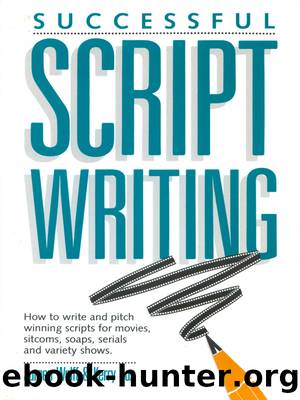Successful Scriptwriting by Jurgen Wolff

Author:Jurgen Wolff
Language: eng
Format: epub
Tags: ebook, book
Publisher: F+W Media
Published: 2011-05-26T00:00:00+00:00
No. This is a common mistake, and one that spells disaster for your second act. Your story should continue to build through the act break, reaching its point-of-no-return roughly halfway through the second act. The reason is quite simple: if you jam all your complications into the first act and peak there, what do you do for the next twenty pages? You lose all pace and momentum, and your story comes to a screeching halt, as does the interest of your reader/viewer.
The act break is the midpoint of your story, and is really just another story beat that happens to have a lot more significance than any of the beats preceding it. Itâs the turning point that sends the plot in a new and hopefully unique and funny direction, the surprise twist you build in to keep your audience loyal to you through two minutes of fast food commercials. So, continuing our âNewhartâ storyline, the act break might come when, after convincing everyone in the lodge to leave for the weekend and let him finish the final chapter in his book, the chapter that has taken five years just to outline, but the one he now feels welling up inside him, Dick finds himself staring at blank paper and realizing that he simply canât do it.
Act II
The first scene in Act II is obviously dictated by the cliffhanger left for us at the end of Act I. As in every script, there are lots of choices availableâthe key is to find the avenue that affords the most complications and the biggest laughs. We might open with a tight shot of Dick yanking a piece of paper out of the typewriter, balling it up, and taking aim at a trash can. When we pull back, we see the trash can is completely buried by similar wads of paper. Thereâs no way he can even see it, much less hit it. He watches the paper ball tumble down the stack, stares at it a moment⦠and then scoops his typewriter up and heaves it along the same path.
As you can see, weâve taken the idea of his novel being revealed as nothing more than a pipedream (end of Act I) and reinforced it, rubbed his nose in it, with our first scene in Act II. The next scene must build upon that idea, and begin to incorporate the glimmerings of a solution. It doesnât have to be a correct solution, or an effective solution, just a funny solution, given his characterâs personality. Would he just knuckle down and pound out any old trash just to finish, knowing full well it will be rejected? Would he secretly toss in the towel, while maintaining a facade of great progress and accomplishment when his wife and friends come back? Or, would he clean up the mess, and admit to himself, and his wife and friends, that he just isnât a novelist, that he oughta be happy with his role as a successful how-to writer, and
Download
This site does not store any files on its server. We only index and link to content provided by other sites. Please contact the content providers to delete copyright contents if any and email us, we'll remove relevant links or contents immediately.
| Publishing & Books | Research |
| Writing |
Asking the Right Questions: A Guide to Critical Thinking by M. Neil Browne & Stuart M. Keeley(5759)
Autoboyography by Christina Lauren(5227)
Eat That Frog! by Brian Tracy(4526)
Dialogue by Robert McKee(4389)
Sticky Fingers by Joe Hagan(4188)
Journeys Out of the Body by Robert Monroe(3615)
Annapurna by Maurice Herzog(3464)
Full Circle by Michael Palin(3443)
Schaum's Quick Guide to Writing Great Short Stories by Margaret Lucke(3374)
Elements of Style 2017 by Richard De A'Morelli(3341)
The Art of Dramatic Writing: Its Basis in the Creative Interpretation of Human Motives by Egri Lajos(3058)
Atlas Obscura by Joshua Foer(2953)
Why I Write by George Orwell(2945)
The Fight by Norman Mailer(2930)
The Diviners by Libba Bray(2927)
In Patagonia by Bruce Chatwin(2920)
The Mental Game of Writing: How to Overcome Obstacles, Stay Creative and Productive, and Free Your Mind for Success by James Scott Bell(2897)
Venice by Jan Morris(2568)
The Elements of Style by William Strunk and E. B. White(2470)
